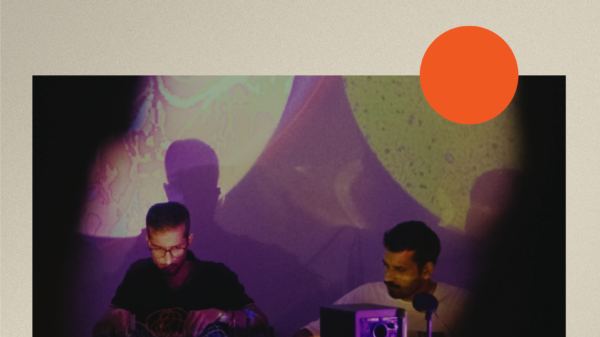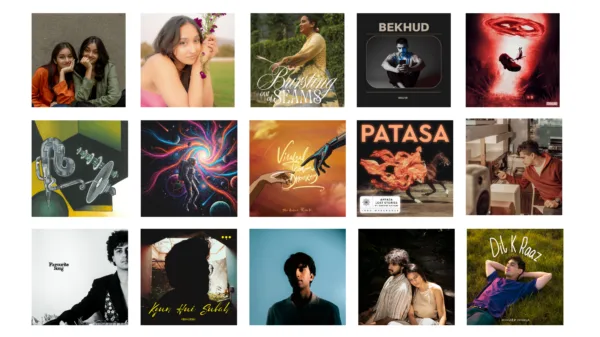Rahul Menon, the former frontman of the Bangalore based alt-rock band, Kyojin, has ventured into his brand new project by releasing his debut EP ‘Reptiles’ under the alias Dime Store Reject. Rahul Menon is a 20-year-old UK-based singer-songwriter, originally from Bangalore, India, whose work on alt-rock project ‘Kyojin’ yielded well received studio albums released at the ages of 17 and then 19. Following this, a step was taken into the role of a solo artist. “I’ve been writing and composing music for a while now, but I’ve only recently taken a step into the world of production, Reptiles was my first self-produced project and alongside this I’m also working on other people’s music as well”, says Rahul Menon.
In an attempt to distance himself from his previous sound, Rahul has slowly been transitioning to a new persona: Dime Store Reject. With this transformation, he looks to shift sound to a unique blend of acoustic folk and electronica – a blend Rahul affectionately refers to as ‘Purple Pop’. ‘Reptiles’, his debut EP, is rife with the sounds Rahul has created through embarking on his own production style for the first time – sounds characterised by synthetic harmonies, warm guitars and lush synthesizers.
Lockdown and the subsequent feelings of isolation and loneliness have inspired this EP, along with recurrent themes of love and betrayal. The EP lies somewhere between the musical genres of indie folk and slow trance, and at the same time is quite intellectually simulating as well. All the tracks have been finely produced in this EP, with attention to detail given to every sound and note. Eccentric sounds have been taken from everyday life including percussive, robotic and even chipmunk sounds to make this EP unique. Menon’s vocals effortlessly blend in with the instrumentation, going hand in hand with each other. Many genres of music such as trance, ambient and indie folk culminate to provide a therapeutic experience for the soul. Interestingly, this EP was inspired by American indie band Bon Iver’s debut album ‘For Emma, Forever Ago’, which was also recorded when Justin Vernon, the main songwriter, spent some time in isolation.
“It was pretty much a product of experimentation. I started working with digital harmony and treating my voice like more of an instrument than a lead part. That pretty much defined the sound of the EP, in my opinion. As for the alias ‘Dime Store Reject’, it’s a lyric I wrote for the track Dimes, and it was just self-deprecating enough for me to enjoy the image it portrays. As time went on, I just became more and more comfortable having it as my creative persona.” says Rahul Menon.
The first track ‘Reptiles’ begins with some funky sounds, and later transitions into a melodic guitar riff. The song follows the story of an estranged lover, battling the uncertainty of separation while coming to terms with individuality; it represents the larger ‘Reptiles’ EP as a whole, which is a musical representation of the battle between the mind and heart. Menon’s vocals are charming, hitting the falsetto notes at sweet spots, and are also reminiscent of neo-soul sounds such as that of Thai singer-songwriter Phum Viphurit.
The second track ‘Glass’ mainly tackles themes of separation and loneliness, it masquerades as a story of the ransacking of an empire: a historical allegory to the tragedy behind separation, and how ugly it can get. The third track ‘Dimes’ is about how the first moments of a relationship are so other-worldly and powerful. Initially, the significant other seems like the best person in the world but gradually they show signs of leaving – a tale often too common nowadays in the daily relationships people build. Sonically, the track is built on ambient-pop music with moody undertones, along with a lot of soothing reverb.
‘Gaslight’ is a personal favourite, with sweet chipmunk sounds echoing some of the lyrics in the intro. The track is slow-paced and rhythmic. Even though the track is based on a single riff, it doesn’t disappoint with the addition of quirky electronically produced sounds in between. Rahul adds, “This track holds a special place in my heart of being the most lyrically significant, and one that I wrote while delving into themes of normalcy and stagnation. The song plays as a story of betrayal and encumbrance, and how tough times have fallen on the protagonist so significantly that he blames the world for how he will never find normalcy. This is incredibly pressing in the context of the modern Indian music industry, where those ideas of normalcy – a car, a house, a lawn and kids – are so unbelievably unattainable for someone just starting out.”
Rightly pointed out, this is the struggle many indie musicians have to face, choosing between a settled life, with all its materialistic comforts and on the other hand, following their creative pursuits which may not immediately lead them to a comfortable life. This track truly encapsulates this feeling.
‘Black’, the final track is an ode to regret. It’s a heavy, melancholic piece that features raspy vocals that remind us of times when we’re lying alone, thinking about what we could’ve been. Rahul adds, “I decided to go for a quiet, sombre end to the EP to highlight its main themes: isolation, uncertainty, and regret”. This track also has some trance-pop vibes to it.

When asked about his future plans, Rahul says, “I’m excited to venture into all sorts of creative pursuits. My live show has become something of a film, it’s an audio-visual journey with prepared bits and interludes, and I really enjoyed launching the EP alongside the show. I’m excited to do more things like that, collaborate with filmmakers and visual artists, as well as musicians with a unique voice in their field.”
Production wise, ‘Reptiles’ is unlike any EP that has sprouted from Indian musicians in the recent times. Thematically, this EP serves us as a reminder that even though we might be lonely, heartbroken or isolated, there can always be something to look forward to. We can all face uncertainty and loneliness at some point in our lives, but we can also try to do something meaningful and make a difference if we set our heart to it. ‘Reptiles’ is a beautiful example of this, as it is shows us that being with oneself can lead to our creative expressions reaching their pinnacle.



























